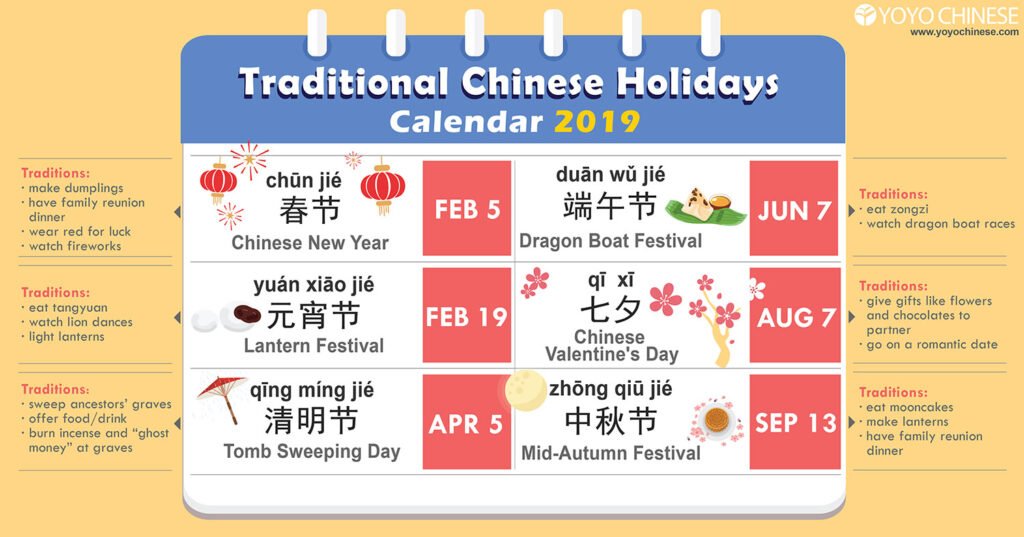Notice of the General Office of the State Council on the Arrangement of Some Holidays in 2021
1. New Year’s Day: January 1st to 3rd, 2021, 3 days in total.
2. The Spring Festival: February 11 to 17 will be closed for a holiday, a total of 7 days. Work on February 7 (Sunday) and February 20 (Saturday).
3. Tomb Sweeping Festival: April 3 to 5 will be closed for a total of 3 days.
4. Labor Day: May 1st to 5th, the holiday will be adjusted for a total of 5 days. Work on April 25 (Sunday) and May 8 (Saturday).
5. Dragon Boat Festival: It will be closed from June 12th to 14th, a total of 3 days.
6. Mid-Autumn Festival: September 19-21 will be closed for a total of 3 days. Work on September 18 (Saturday).
7. National Day: October 1st to 7th, the holiday will be adjusted for a total of 7 days. Work on September 26 (Sunday) and October 9 (Saturday).
The traditional Chinese festivals in chronological order are as follows:
1. Chinese New Year
The Spring Festival is the first day of the first month of the lunar calendar. This is the grandest and lively traditional festival in our country. The Spring Festival is here, which means that spring is coming, Vientiane is reviving and renewing vegetation, and a new round of planting and harvesting season is about to begin.
The Spring Festival means the beginning of the year, and it is also a farewell to the past year. The wanderers who went out on this day returned home to enjoy the joy of reunion.
2. Lantern Festival
Every year on the fifteenth day of the first month of the lunar calendar, just after the Spring Festival, it is the traditional Chinese festival-Lantern Festival. According to Chinese folk tradition, on this night when the moon is high in the sky, people will light up thousands of colorful lanterns to celebrate. Go out to admire the moon, light up the lights, guess the riddles, eat the Lantern Festival together, reunite with the family, and celebrate the festive season.
3. Ching Ming Festival
Tomb-sweeping Festival is a traditional festival in our country, and it is also the most important festival for worshipping ancestors and sweeping tombs. Tomb-sweeping is commonly known as going to the grave, an activity of offering sacrifices to the dead.
4. The Dragon Boat Festival
The fifth day of the fifth month of the lunar calendar is the Dragon Boat Festival, a traditional Chinese folk festival. It is one of the ancient traditional festivals of the Chinese nation. The Dragon Boat Festival is also called Duanwu, Duanyang. In addition, there are many other names for the Dragon Boat Festival, such as Wuri Festival, Chongwu Festival, May Festival, Yulan Festival, Girl’s Festival, Tianzhong Festival, Dila, Poet’s Festival, Dragon Day, etc.
5. Qixi Festival
In our country, on the night of the seventh day of the seventh lunar month, the weather is warm and the vegetation is fragrant. This is commonly known as the Qixi Festival, and it is also called the “Qiao Qiao Festival” or “Girl’s Day”. This is the most romantic Chinese traditional festival. A festival was also a day that girls valued most in the past. Now it is also called Chinese Valentine’s Day.
6. Mid-Autumn Festival
Every year on the 15th day of the eighth lunar calendar is the traditional Mid-Autumn Festival. This is the mid-autumn period of the year, so it is called the Mid-Autumn Festival. On this day, people look up to the bright moon in the sky like a jade plate, and naturally look forward to family reunion. The wanderers far away also take this to express their feelings for their hometown and their relatives. Therefore, the Mid-Autumn Festival is also called the “Reunion Festival”.
7. Double Ninth Festival
The 9th day of the ninth month of the lunar calendar is the traditional Double Ninth Festival. Because the ancient “Book of Changes” set “six” as the yin number and “nine” as the yang number. On September 9th, the sun and the moon are both yang, and the two nines are heavy, so it is called Chongyang and Chongjiu. On this day, people climbed high and looked far away, eating Chongyang Cake, drinking chrysanthemum wine, and so on. Nowadays, Chongyang Festival gives respect and filial piety to the elderly, which is the Respect for the Aged Day.
8. The winter solstice festival
The Winter Solstice Festival is set according to solar terms, and the time is between December 22 or 23 of the Gregorian calendar each year. The winter solstice is the shortest day and the longest night in the northern hemisphere throughout the year. After the winter solstice, the day will become longer. People will cook many delicacies on this day, such as dumplings in the north and lamb in the south.

